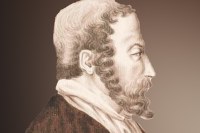An eccentric humanist, Bocchi was a professor at the University of Bologna for most of his life, although he also devoted much time to his personal interests. His eclectic, lively Academy of the Hermathena was a typical Renaissance intellectual organisation, that produced a sophisticated iconographic primer authored by Bocchi and titled the Symbolicarum quaestionum.
 Achille Bocchi was born in 1488 to an old aristocratic family, several generations of which had held prestigious professorships at the University of Bologna.
Achille Bocchi was born in 1488 to an old aristocratic family, several generations of which had held prestigious professorships at the University of Bologna.
He studied Latin, Greek and even Hebrew. After taking a degree in humanities, he began teaching Greek literature in 1508.
His teacher had been Giovan Battista Pio, one of the greatest Italian humanists and pedagogues of the time (he was even one of Isabella d’Este’s tutors). As soon as he received his professorship, Bocchi defended his teacher in his Apologia in Plautum, dedicated to the cardinal Raffaele Riario and written as an intelligent counter-attack to criticism of Pio’s Commentaria in Plautum. Together with the invective, there was also a translation of Plutarch’s biography of Cicero, this time dedicated to the bishop Achille Grassi, uncle of Taddea Grassi, whom Bocchi had recently married. In 1509, Bocchi again lavished praise on the classical learning of his teacher in the collection Carmina in laudem Io Baptistae Pii.
In 1512, he became professor of rhetoric and poetics, and in 1517 he presented the Senate with the first volume of his Historia Bononiensis: an encyclopaedic historiographical work that occupied him until 1551, the year in which he completed Book XVII , covering the city’s history until 1263. His son Pirro, also a university professor, later completed Book XVIII, after which the project remained unfinished. In 1700, the Istituto delle Scienze proposed publishing it in its incomplete form, but was quickly persuaded otherwise by Eustachio Manfredi’s savage criticism of the mistakes and errors in the text.
Besides his work on the history of Bologna, Bocchi undertook important diplomatic missions for which he was elevated to the coveted imperial rank of Count Palatine and Knight of the Golden Spur (1520). Often in Rome, he also won the appreciation of Leo X, to whom he dedicated a short collection of poetry: Lusuum libellus ad Leonem X P.O.M.
He then became involved in local politics, serving in the College of Elders from 1522 to 1530. In the meantime, he was also secretary to the cardinal legate Guido Ascanio Sforza, nephew of Paolo III, thanks to whom the Riformatori dello Studio granted him an exemption from teaching while maintaining his salary and humanities chair, which he managed to keep from 1525 to 1562.
The eclectic and fascinating Bocchi always drew the sympathy and protection of numerous nobles, the company of countless intellectuals and the trust of various religious figures. The latter included Iacopo Sadoleto, a cardinal open to Protestant demands, and Camillo Renato, known as Lisia Fileno, a heretical Waldensian to whom Bocchi offered protection from the accusations of the Inquisition in 1540.
For much of his life, Bocchi was critical of the Church, its dogmas and its culture, favouring the syncretic philosophical thought typical of Renaissance humanists. As he grew older, however, he became enthusiastic about Catholic orthodoxy, drawn to the new Jesuit doctrines.
In 1546, work began on his vast palazzo designed by Vignola and in what is now via Goito. Built in the modern style without a portico and featuring a massive rusticated base, the building still preserves two inscriptions carved into the facade. One is in Latin and drawn from Horace’s first book of Epistles, “If you do right, you shall be king”; the other is in Hebrew and taken from Psalm 120, “Save me, O Lord, from lying lips and from deceitful tongues”. Judging from a print by Giulio Bonasone, there were statues of Hermes and Athena on the building’s cornice, the gods to which Bocchi dedicated his philosophical academy of the Hermathena. Before he was able to receive academy members and friends in the ground floor rooms of his home, frescoed by Prospero Fontana, Bocchi was hosted in the palazzo of Cardinal Poggi, now the seat of the University of Bologna.
The erudite and student-oriented group immediately received the protection of Paul III and was supported by his nephew, the cardinal Alessandro Farnese.
Bocchi drew his most important work from their heated debates and erudite meetings: Symbolicarum quaestionum de universo genere quas serio ludebat libri quinque, dedicated to Paul IV and published in 1555 by the academy.
The 151 epigrams illustrated by Giulio Bonasone on designs by Fontana were inspired by Andrea Alciato’s Emblemata, which he likely came to know in the early 16th century when he was studying law at the University of Bologna. The volume is filled with references to local culture and life, but is also characterised by elegant Petrarchan motifs, erotic Alexandrian references, and eastern and mystical symbolism. The latter were drawn from the Orapollo by Filippo Fasanini, Bocchi’s colleague and rival, as well as professor of rhetoric and poetry starting in 1512.
The Symbolicarum quaestionum was to include three further books devoted to cabalistic and theological symbols, but they were never produced. In 1556, the Academy of the Hermathena was forced to yield to the times and disband. The period that saw Bocchi numbered among the leading figures of an eclectic, sophisticated culture was in decline, censured by the rigid requirements of the Church, which was in the throes of reformation and found its new creator of iconology in Bologna as well, in the person of cardinal Gabriele Paleotti, who had himself participated in the festive meetings at Palazzo Bocchi.
